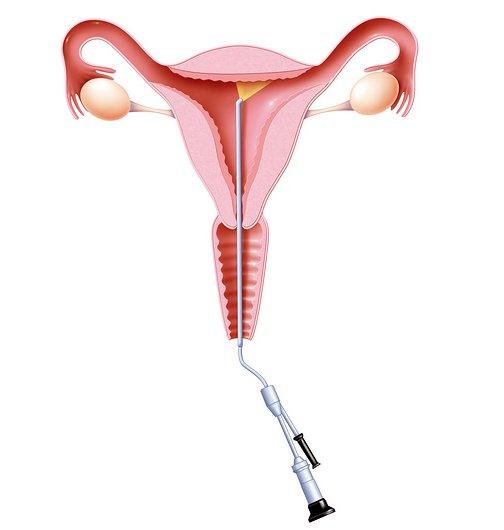Thousands more women with heavy periods to be offered test
- Published

Around a quarter of women of reproductive age are affected by heavy bleeding
Women with heavy periods should be offered a hysteroscopy to find out the cause, says new guidance from health officials.
This could lead to 10,000 more women in England having the test, which examines the inside of the womb, each year, they said.
Around one in 20 women aged 30-49 sees a GP due to heavy menstrual bleeding.
The issue can seriously affect quality of life, both physically and emotionally.
The National Institute for Health and Care Excellence (NICE) said it had updated its guidance because of advances in diagnostic techniques.
It now recommends hysteroscopy, external as a first-line test for women with heavy menstrual bleeding, instead of pelvic ultrasound, because it is gives a more accurate diagnosis.

A hysteroscopy examines the inside of the womb
Hysteroscopy uses a narrow telescope with a light and camera at the end to examine the inside of the womb, passed through the vagina.
Prof Mark Baker, director of the centre for guidelines at NICE, said: "This change should help ensure women with underlying endometrial diseases or conditions are more effectively diagnosed and can therefore receive better treatment.
"Not only this, but the cost of additional hysteroscopy will be offset by savings from fewer ultrasound investigations and fewer appointments following the diagnostic test."
The guidance says miniature hysteroscopes should be used and painkillers provided to ensure the procedure is as pain-free as possible.
However, for many women at low risk of underlying gynaecological problems, a hormonal contraceptive from their GP could also be a good first step, NICE said.
Around 5,000 women currently have a hysteroscopy in England each year.
Jonathan Lord, consultant in obstetrics and gynaecology at Royal Cornwall Hospitals NHS Trust and NICE committee member, said women should be offered a range of options.
"There is also a shift in emphasis from doing simple but ineffective tests in many, to more focused but accurate tests where these are needed."
What causes heavy periods?
The cause of heavy periods can't always be identified but can include:
polycystic ovary syndrome (PCOS)
pelvic inflammatory disease (PID)
fibroids - non-cancerous growths that develop in or around the womb
adenomyosis - when tissue from the womb lining becomes embedded in the wall of the womb
endometriosis
an underactive thyroid gland (hypothyroidism)
cervical or endometrial polyps
blood-clotting disorders
cancer of the womb (although this is relatively rare)
- Published9 March 2018

- Published15 February 2018

- Published19 January 2018
